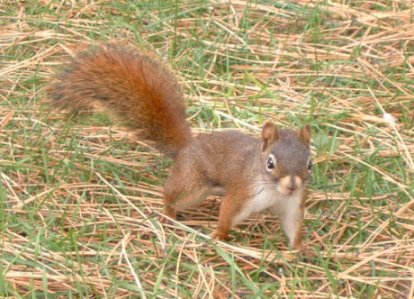|
"Just a note to thank you for your excellent advice concerning a problem with a squirrel in the chimney! I was
kind of frantic and so was the squirrel! I took your advice and it worked like a charm. It also saved me a $350 fee to
have a company remove him."
Having a problem with wildlife can be extremely frustrating. It is important to remember there is a solution and it is a TEMPORARY situation.
Wild animals tend to be around our homes for one of two reasons:
-
Food Source - bird feeder, pet food, garbage etc.
-
Potential Shelter - most common during the birthing season, which runs from late February to early October, when pregnant females are desperate to find a safe place to have their young, and during the fall, when animals are seeking a place to hunker down for the winter.
Although you are only seeing one animal, it may not be alone. The birthing season runs from late February to early October, and the babies are helpless when first born and would not yet be able to go out with mom. It is critical not to trap young inside, as they will perish, possibly falling between walls and requiring expensive drywall removal and causing very bad odours if they die in inaccessible areas.
Trapping and Relocating
It is natural to think that trapping and relocating is the answer, but STOP AND READ THIS FIRST:
-
Under the Ontario Ministry of Natural Resources, Fish and Wildlife Conservation Act it is illegal to trap and relocate any wild animal beyond close proximity to the point of capture, which of course makes trapping quite pointless.
-
Even if you could take the animal away, it simply would open up a space for another animal to move in and utilize the resources. Instead, figure out what is attracting the animal and remove the appeal.
-
Babies left to die in inaccessible places in your attic, or under your step/shed,
will result in bad smells and a lot of money for expensive repair jobs for homeowners
-
You or your neighbours could be left with the unpleasant decision of
whether to care for these baby animals or have them put down
-
A barricaded animal can cause a lot of damage trying to get back in to their young, or in trying to escape.
There is a lot of information to digest and everyone from your neighbour to your in-laws will have a suggestion on how best to solve your wildlife problem. It is definitely worthwhile to research all potential solutions, as there are effective and inexpensive solutions to wildlife problems.
REMEMBER:
-
The wildlife birthing period peaks between April and June.
-
Females seek shelter in attics, chimneys and under steps for a safe spot to have their young.
-
This is a TEMPORARY situation, the safest option is to give a grace period until babies are coming out with mom, before undertaking animal proofing.
-
A barricaded animal can cause damage trying to access her young or trying to get out.
-
If you trap babies inside they will die and cause a bad smell.
-
Wildlife removal companies can be costly and cannot guarantee they will not create orphans.
|


